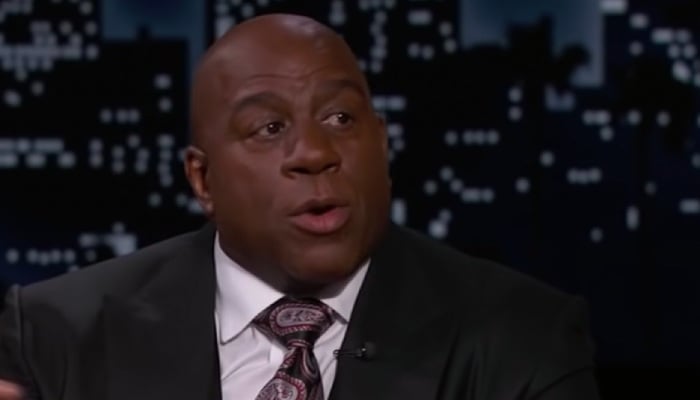Par Joël Pütz | Journaliste sportif
Magic Johnson’s career took a dramatic turn after the announcement of his HIV diagnosis. The revelation pushed the former Lakers star into his first retirement — a decision he later reflected on with surprising honesty. Years later, the Hall of Famer still admits to having regrets.
Even today, his sporting achievement remains astounding. Only Stephen Curry seems to challenge his status as the greatest point guard of all time. A five-time NBA champion, three-time regular season MVP and Finals MVP, and widely considered the greatest passer in league history — Magic Johnson left an undeniable mark on the game.
In the 1980s, it was almost impossible to chase a title without crossing paths with him. Between 1980 and 1991, he only missed the NBA Finals twice — in 1986 and 1990. He was the brain behind the Lakers’ “Showtime” era, first a teammate and eventually the successor to Kareem Abdul-Jabbar as the face of the franchise. His rivalry with Larry Bird defined a basketball generation.
So when Magic announced his first retirement, it sent shockwaves through the basketball world — especially considering the extraordinary circumstances. At a press conference before the 1991–92 season, he revealed he had contracted HIV, prompting an immediate retirement to focus on his health. He has since become a symbol of strength and recovery.
Magic Johnson’s First Retirement — a Mistake, According to Him
In a 2012 interview with Bill Simmons, the former Lakers legend admitted he had serious regrets about his decision, which in hindsight he considered too rushed — especially since he still felt great joy playing the game:
“I should have stayed and played that season. Despite everything, I should have stayed and played. You can get cut, or you can retire like I did, but I should’ve stayed.”
It’s important to remember that back then, information about HIV was limited. Paranoia spread quickly among the public and, more crucially, among other NBA players, many of whom were unsure how the virus was transmitted. Karl Malone, for example, made particularly harsh comments about Magic before the 1992 All-Star Game.
Interestingly, Magic did return to the court not long after. He was part of the legendary 1992 Dream Team at the Barcelona Olympics and was also invited to play in the All-Star Game that year, where he won MVP honors. A few years later, in the 1995–96 season, he returned to the Lakers for a final stint, playing 32 games. He wasn’t quite the same player, but it gave him a chance to make peace with what he considered a misstep.
In hindsight, it’s easy to understand Magic Johnson’s regret — he felt he deprived himself of the game he loved so deeply. Yet it’s also clear that stepping away was the right choice for his health. His recovery allowed him to become a prominent advocate for HIV awareness and education, turning his personal battle into a platform for global impact.


